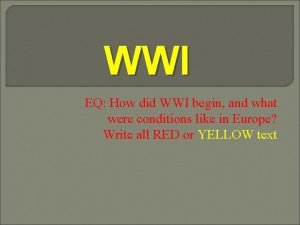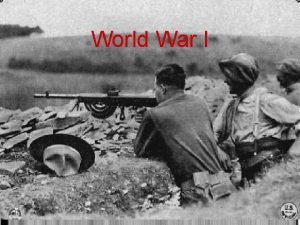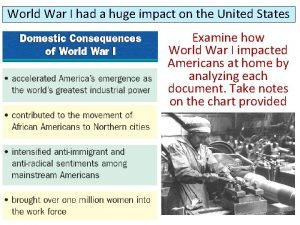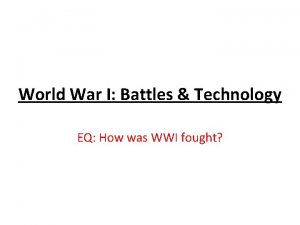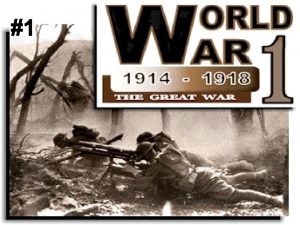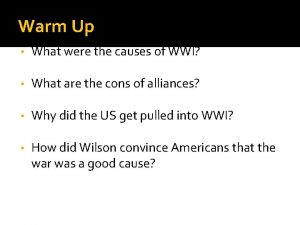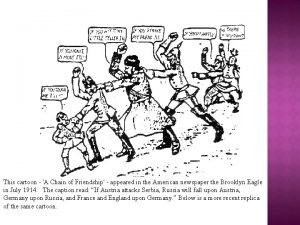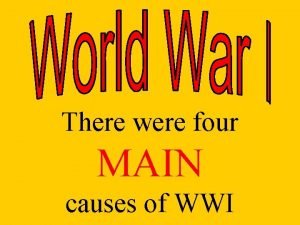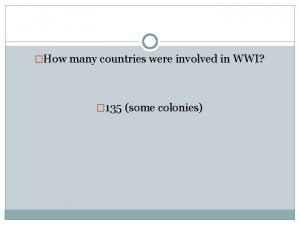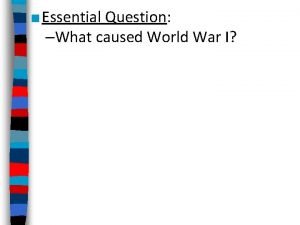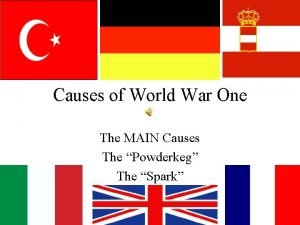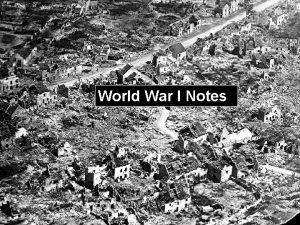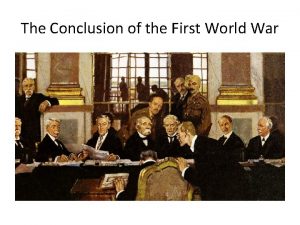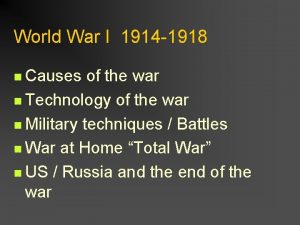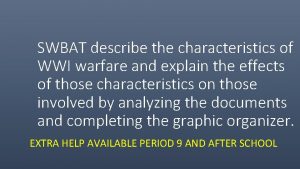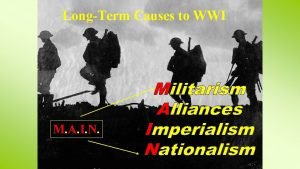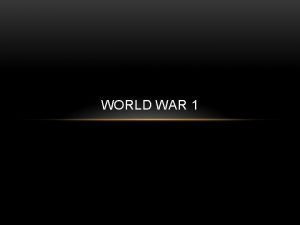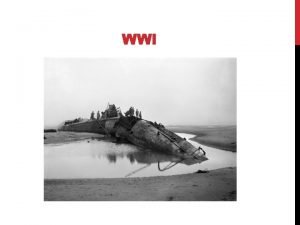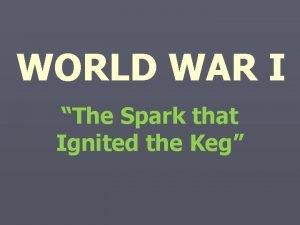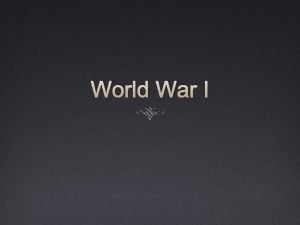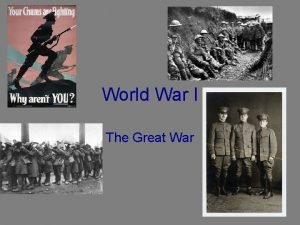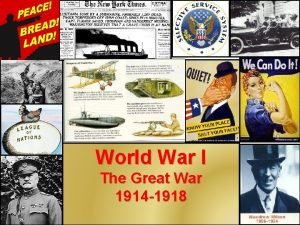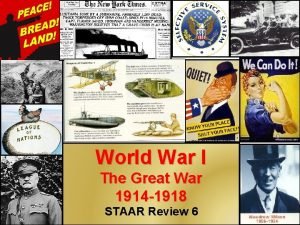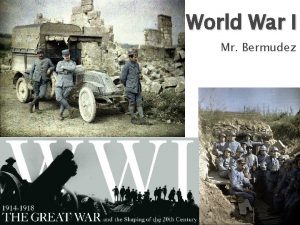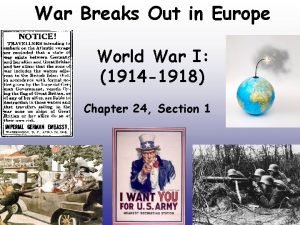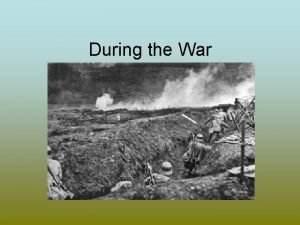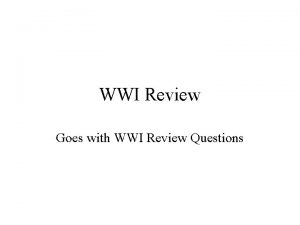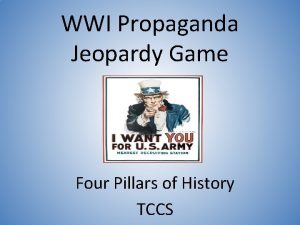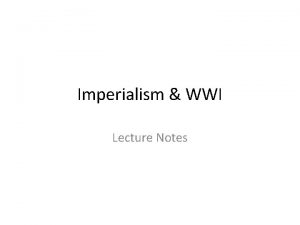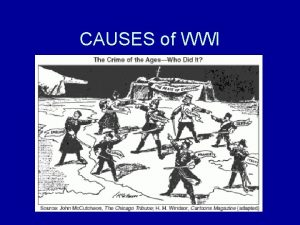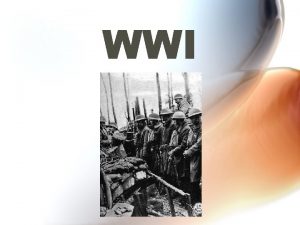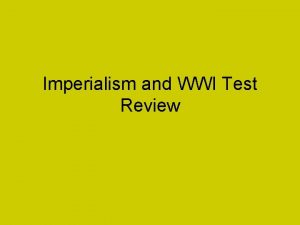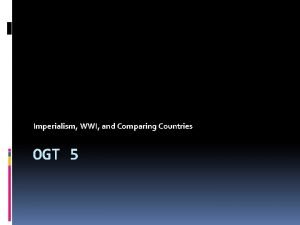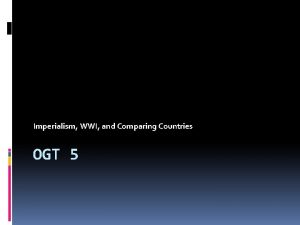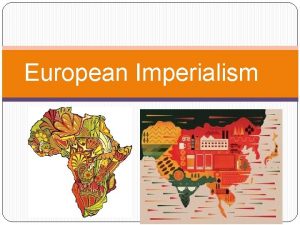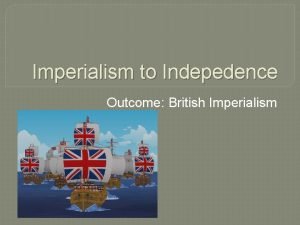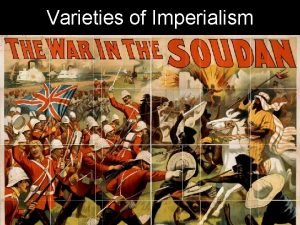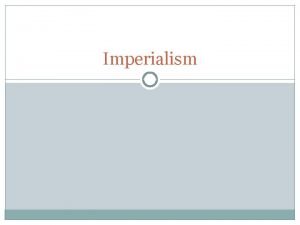US Imperialism WWI Unit 4 What is Imperialism




































- Slides: 36

US Imperialism & WWI Unit 4

What is Imperialism? • Imperialism: – Attempt by stronger nations to create empires by dominating weaker nations – economically, politically, culturally, or militarily.

Motives for Expansion 1. Economic: – Industry requires resources (rubber, petroleum, etc) – Need someone to sell your goods to • New markets

Motives for Expansion 2. Military Factors – Improvement in European military technology – Navies acquiring bases around the world for supplies Maxim Gun

Motives for Expansion 3. Nationalism – Your nations people, ideals, and goals are superior to others – If your neighbor acquires new land, you should too.

Motives for Expansion 4. Humanitarian – Spread of religion (primarily Christianity) – Spread of “western cultural blessings” • White Man’s Burden

Hawaii • American sugar merchants gained influence from 1870 s 1890 s – Pearl Harbor naval base established in 1887 • American businessmen led overthrew of Queen Liliuokalani in 1893 – Established Sanford B. Dole as president • Hawaii annexed in 1898

The Spanish American War, 1898 • U. S. first attacked Spain in the Philippines – Quickly defeated Spanish fleet • Military victory in Cuba was swift – Teddy Roosevelt’s “Rough Riders” (San Juan Hill) – Black soldiers comprised much of the army • War ended on August 12, 1898


“A Splendid Little War” • U. S. acquired Cuba, Puerto Rico, Guam, and the Philippines. • Acquisition of the Philippines was heavily debated in Congress – Anti-Imperialist League • W. J. Bryan, Andrew Carnegie, Booker T. Washington, and Mark Twain were among those who opposed imperialism – Treaty was narrowly approved in Feb. 1899

Cuba • U. S. withdrawal was contingent on the Platt Amendment: 1. Restricted Cuba’s autonomy in foreign relations 2. Lease of naval bases to the U. S. 3. Authorized U. S. intervention to maintain order and preserve Cuban independence

The Filipino-American War • Filipino nationalists had fought against Spain, welcomed American victory – Emilio Aguinaldo declared independence, U. S. refused • U. S. military used harsh tactics to suppress resistance – concentration camps, mass killings

The Roosevelt Corollary • Roosevelt stated that the U. S. had the right to exercise “an international police power” to protect its interests in Latin America – “Big Stick Diplomacy” • Latin American countries resented American intervention

Wilson and Latin America • Wilson vowed to abandon imperialism, but didn’t – American military took control in Haiti, Dominican Republic, Cuba • Wilson interfered with the revolutions taking place in Mexico – Pancho Villa led raids on U. S. in 1916, General John J. Pershing sent to pursue

Causes of WWI • Imperialism: – Western scramble for colonies (Africa, Asia, and the Pacific) – Great Britain and France have the most land – resources – Germany wants more power take land from other colonizers

Causes of WWI • Militarism: – Policy involving building a nation’s armed forces in preparation for war. – Military has more control over government & foreign policy • Key European players: – Austria-Hungary, France, Germany, Great Britain, and Russia

Causes of WWI • Nationalism: – Your countries interests over the interests of others • Ethnic minorities – Want independence – Big countries protect ethnic minorities in other countries (Russia & Serbs)

Causes of WWI • Alliances: – Bolster each countries security • “Blank Check” – Germany Austria-Hungary – Russia France – Great Britain France

Assassination • June 28, 1914 – Archduke Francis Ferdinand (Austria. Hungarian Empire) visits troops in Sarajevo, the capital Bosnia. – Gavrilo Princip • 19 year old Bosnian Serb • Member of terrorist group “Black Hand”

Mobilization • July 23, 1914 – Austria-Hungary demands Serbia stop supporting terrorism in Bosnia. • Two day warning. • July 28, 1914 –war declared by Austria-Hungary

Mobilization • August 1, 1914 – Germany declares war on Russia • Schlieffen Plan (Germany) – Eliminate France quickly, then turn on Russia – Belgium ruins plan

Key Players • Central Powers: Germany, and Austria-Hungary, Turkey • Allies: Great Britain, France, Russia, Serbia • Stalemate: neither side can gain an advantage. – “Trench warfare”

The Fighting Starts • After Germany’s invasion of Belgium, Germany and the allies became entrenched along the “Western Front” – created trenches – “no man’s land” • Trench warfare led to enormous casualty rates – Little ground ever gained by either side

German Submarine Warfare • German U-boat – Submarine – Germany began allowing submarines to fire on British merchant ships without warning. – Bad public image • Sussex Pledge – Sinking of the Lusitania (May 7, 1915) – German promise to US to warn ships before attacking,

Zimmerman Note • July 31, 1917 – Germany nullifies Sussex Pledge – End of diplomatic relationships between Germany and US – Still no war… • Zimmerman Note: – Germany’s foreign secretary – If Mexico helps Germany, they will get Texas, New Mexico, and Arizona back. – Still no war…

The War Resolution • March 16 -18, 1917 – Germany sinks four US ships – Wilson brings the war resolution to Congress • passed by the Senate and the House, signed by Wilson April 6, 1917 – Is this a “just war”? • Analysis: – Wilson’s Joint Address to Congress Leading to a Declaration of War against Germany (1917)

Where we left off: The U. S. Enters the War • Wilson was reelected in 1916 – “He Kept Us Out of War” – Wilson hoped to mediate conflict • U. S. intercepted the “Zimmerman note” – Germany attempted to lure Mexico into the conflict • Revolution in Russia overthrew the czar • Wilson submitted war message to Congress on April 2, 1917

Raising, Training, and Testing an Army • Congress passed the Selective Service Act establishing a draft – limited training, segregated divisions • American Expeditionary Force was commanded by John J. Pershing – 4. 3 million Americans served (115, 000 died) – African Americans served at high rates

Fighting “Over There” • New weapons changed nature of war – German “Big Bertha” cannon, zeppelins, machine guns, poison gas, tanks, airplanes • Medical technology did not keep pace with weaponry – “trench foot”, diseases, “shell shock”

Organizing the Economy for War • War Industries Board was created to set industrial priorities and supervise business to boost efficiency • Food Administration controlled production and distribution for the U. S. and Allies • National War Labor Board supervised labor relations – guaranteed right of unions to organize, improved work conditions

Women and Minorities • Many job opportunities opened up for women and African Americans – “heavy industry” • Jobs in industry played a major role in the “Great Migration” of African Americans to northern cities

Advertising the War • The government worked to promote a “war spirit” through propaganda • Committee on Public Information – promoted national unity – encouraged Americans to purchase “Liberty Bonds” – depicted Germans as brutal, subhuman

The Collapse of Germany • Mutiny spread among German soldiers and workers • People of Berlin rose in rebellion in November 1918 – Kaiser abdicated throne, fled to the Netherlands • Germany surrendered on November 11 • War’s toll was staggering – 26 million soldier and civilian deaths, 20 million wounded, 10 million refugees – $350 billion direct economic cost

Wilson’s Fourteen Points • Wilson hoped that the ending of the war would bring about a more democratic world system – create new nations, shift borders, ensure selfdetermination – League of Nations • Wilson agreed to travel to Paris for peace negotiations

The Versailles Peace Conference • Delegations were dominated by Allied leaders – Central Powers and Russia were excluded – other Allies sought to punish Germany • Wilson had to compromise on his “points” • Treaty of Versailles – Germany had to accept sole responsibility (war-guilt clause), pay reparations, give up land, limit army, destroy bases – new nation-states were created, some Allies annexed territory – proposed the creation of a League of Nations

The Fight Over the League of Nations • Americans generally favored the Versailles treaty and the League of Nations • Republicans in the Senate stood in opposition – Henry Cabot Lodge – “Irreconcilables” and “Reservationists” • Wilson campaigned for the passage of the treaty but fell ill – immobilized for remainder of his presidency – treaty died in the Senate
 Imperialism definition ww1
Imperialism definition ww1 Motives of old imperialism
Motives of old imperialism Old imperialism motives
Old imperialism motives Ww1 webquest answer key
Ww1 webquest answer key Italian gains in ww1
Italian gains in ww1 Wwi n
Wwi n Main cause of world war 1
Main cause of world war 1 Impact of wwi
Impact of wwi New technology in wwi
New technology in wwi List the allied powers and the central powers
List the allied powers and the central powers New technology in wwi
New technology in wwi Friendship cartoon
Friendship cartoon Wwi
Wwi How many countries were involved in wwi
How many countries were involved in wwi Nationalism in europe
Nationalism in europe Main wwi
Main wwi Wwi background
Wwi background Mania in ww1
Mania in ww1 Conclusion of world war 1
Conclusion of world war 1 Cold war jeopardy review game
Cold war jeopardy review game Weapons of wwi
Weapons of wwi Nationalism wwi
Nationalism wwi Wwi
Wwi Main long term & immediate causes of wwi
Main long term & immediate causes of wwi What countries were involved in wwi
What countries were involved in wwi Kwl chart world war 1
Kwl chart world war 1 Crash course wwi
Crash course wwi What was the spark that ignited world war 1
What was the spark that ignited world war 1 Powder keg of europe ww1
Powder keg of europe ww1 Wwi eastern front
Wwi eastern front 4 causes of ww1
4 causes of ww1 Major causes of world war 1
Major causes of world war 1 Who were the allies in ww1
Who were the allies in ww1 Where was the british naval blockade ww1
Where was the british naval blockade ww1 Alliances cartoon
Alliances cartoon Wwi
Wwi Bandwagon
Bandwagon




